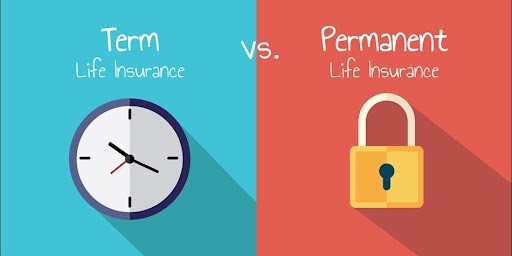Life insurance is an important aspect of anyone’s financial planning, providing a safety net for your loved ones in case of unexpected events. However, choosing the right type of life insurance can be a difficult decision. Term life insurance and permanent life insurance are two of the most popular types of life insurance. Each type has its own unique features, benefits, and drawbacks. In this article, we will explore the differences between term and permanent life insurance to help you decide which one is right for you.
Term Life Insurance
Term life insurance provides coverage for a specific period, usually something like 10, 20, or 30 years. If you die during the term, the insurance company will pay a death benefit to your beneficiaries. If you outlive the time, the policy will expire, and you will no longer have coverage. Term life insurance is typically less expensive than permanent life insurance because it has no cash value component.
Benefits of Term Life Insurance
1. Affordable premiums:
Term life insurance is typically less expensive than permanent life insurance because it only provides coverage for a specific period of time.
2. Flexibility: You can choose the length of the term that best fits your needs, such as 10, 20, or 30 years.
3. Simplicity: Term life insurance is straightforward and easy to understand. You don’t need to think about complex investment components or cash values to consider.
Drawbacks of Term Life Insurance
1. No cash value: Term life insurance does not have a cash value component, so it does not build equity or have an investment component.
2. Limited coverage period: Once the term is up, the policy will expire, and you will no longer have coverage.
3. No benefits if you outlive the term: If you survive the term, you will not receive any benefits, and the premiums you paid will be lost.
Permanent Life Insurance
Permanent life insurance provides coverage for your entire life, as long as you pay the premiums. In addition, permanent life insurance policies have a tax-deferred cash value component that grows over time. The cash value can be used to pay premiums, take out loans, or be surrendered for cash.
Benefits of Permanent Life Insurance
1. Lifetime coverage: Permanent life insurance provides coverage for your entire life, as long as you pay the premiums.
2. Cash value: Permanent life insurance has a cash value component that grows tax-deferred over time and can be used to pay premiums, take out loans, or be surrendered for cash.
3. Guaranteed benefits: Permanent life insurance provides a guaranteed death benefit, which means your beneficiaries will receive a payout regardless of when you die.
Drawbacks of Permanent Life Insurance
1. Higher premiums: Permanent life insurance is typically more expensive than term life insurance. This is because it not only covers your entire life, but also has a cash value component.
2. Complexity: Permanent life insurance policies can be complex, with investment components and cash values to consider.
3. Limited flexibility: Once you choose a permanent life insurance policy, it can be difficult to change it because of the investment component and cash value.
Which one is right for you?
Choosing the right life insurance type depends on your needs and circumstances. Here are some factors to consider:
- Budget: If you’re on a tight budget, term life insurance may be the more affordable option. Because it only provides coverage for a specific period of time, premiums tend to be lower than those of permanent life insurance. On the other hand, permanent life insurance tends to have higher premiums because it provides lifetime coverage and includes a cash value component.
- Investment Goals: If you want to use life insurance as an investment, permanent life insurance may be the better option. The cash value component of permanent life insurance allows you to build savings over time that can be used for a variety of purposes, such as funding a child’s education or supplementing your retirement income. However, it’s important to note that the investment returns on permanent life insurance policies may be lower than other investment options, such as mutual funds or stocks.
- Coverage Needs: Consider your coverage needs when deciding which type of life insurance is right for you. If you need coverage for a specific period of time, such as while your children are young or while you’re paying off a mortgage, term life insurance may be the better option. On the other hand, if you need lifetime coverage for estate planning purposes or to provide for a disabled dependent, permanent life insurance may be the more appropriate choice.
- Health Status: Obtaining life insurance coverage may be more difficult or expensive if you have a pre-existing health condition. Term life insurance tends to be more lenient with underwriting standards, so it may be easier to obtain coverage if you have a health condition. On the other hand, permanent life insurance typically requires a medical exam and more extensive underwriting, so it may be more difficult to obtain coverage if you have a health condition.
- Estate Planning Goals: If you have significant assets that you would like to leave to your heirs, permanent life insurance may be a better option. This is because the death benefit is paid out regardless of when you pass away, as long as the premiums are paid. This can help ensure that your heirs receive the funds to pay estate taxes or other expenses arising after your passing. Additionally, the cash value component of permanent life insurance can be used as an estate planning tool, allowing you to transfer assets tax-free to your heirs. If you do not have significant assets to leave to your heirs, term life insurance may be sufficient to provide the coverage your loved ones need in the event of your unexpected passing.
Overall, both term and permanent life insurance have their own unique features and benefits. Term life insurance provides affordable coverage for a specific period of time, while permanent life insurance provides lifetime coverage and a cash value component. The decision ultimately depends on your individual needs and circumstances.
Choosing the right type of life insurance is an important decision that should be taken seriously. Term and permanent life insurance are two of the most popular types, each with unique features and benefits. Consider your unique needs, and estate planning goals when deciding which type of life insurance is right for you. Remember, life insurance is a long-term investment in your family’s financial security, so take the time to choose the right type of coverage for your needs.
Term vs. Permanent Insurance: Which is Right for You?
Term and permanent life insurance both have their own unique advantages and disadvantages. Which one is right for you? Let’s find out here.




